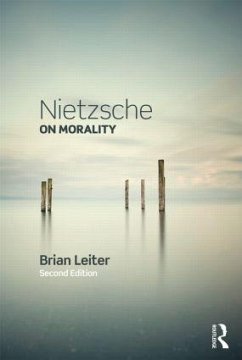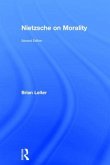Both an introduction to Nietzsche's moral philosophy, and a sustained commentary on his most famous work, On the Genealogy of Morality, this book has become the most widely used and debated secondary source on these topics over the past dozen years. Many of Nietzsche's most famous ideas - the "slave revolt" in morals, the attack on free will, perspectivism, "will to power" and the "ascetic ideal" - are clearly analyzed and explained. The first edition established the centrality of naturalism to Nietzsche's philosophy, generating a substantial scholarly literature to which Leiter responds in an important new Postscript. In addition, Leiter has revised and refreshed the book throughout, taking into account new scholarly literature, and revising or clarifying his treatment of such topics as the objectivity of value, epiphenomenalism and consciousness, and the possibility of "autonomous" agency.
Praise for the first edition:
"[A]rguably the most important book on Nietzsche's philosophy in the past twenty years...." - Mark Jenkins, Journal of Nietzsche Studies (2009)
"[T]he book offers one of the most comprehensive and compelling interpretation of Nietzsche's critique of morality....With its distinctive emphasis on naturalistic themes, it forms a very significant contribution to the study of Nietzsche and is poised to become a work of reference in the field." - Bernard Reginster, Notre Dame Philosophical Reviews (2003)
"[A] rare example of a book of considerable scholarly and philosophical merit that is accessible to a wide audience." - Thomas Carson, Ethics (2004)
"[T]he book sets the standard by which future treatments of this subject matter will be measured...." - Peter Poellner, University of Warwick, UK
"[O]verall, the book does something novel and important, in seeking to expound Nietzsche's thinking specifically about morality to an undergraduate audience, while offering a highly stimulating reading of that thinking itself." - Robert Hopkins, Philosophical Books (2004)
"[A]rguably the most important book on Nietzsche's philosophy in the past twenty years...." - Mark Jenkins, Journal of Nietzsche Studies (2009)
"[T]he book offers one of the most comprehensive and compelling interpretation of Nietzsche's critique of morality....With its distinctive emphasis on naturalistic themes, it forms a very significant contribution to the study of Nietzsche and is poised to become a work of reference in the field." - Bernard Reginster, Notre Dame Philosophical Reviews (2003)
"[A] rare example of a book of considerable scholarly and philosophical merit that is accessible to a wide audience." - Thomas Carson, Ethics (2004)
"[T]he book sets the standard by which future treatments of this subject matter will be measured...." - Peter Poellner, University of Warwick, UK
"[O]verall, the book does something novel and important, in seeking to expound Nietzsche's thinking specifically about morality to an undergraduate audience, while offering a highly stimulating reading of that thinking itself." - Robert Hopkins, Philosophical Books (2004)
Praise for the first edition:
"[A]rguably the most important book on Nietzsche's philosophy in the past twenty years...." - Mark Jenkins, Journal of Nietzsche Studies (2009)
"[T]he book offers one of the most comprehensive and compelling interpretation of Nietzsche's critique of morality....With its distinctive emphasis on naturalistic themes, it forms a very significant contribution to the study of Nietzsche and is poised to become a work of reference in the field." - Bernard Reginster, Notre Dame Philosophical Reviews (2003)
"[A] rare example of a book of considerable scholarly and philosophical merit that is accessible to a wide audience." - Thomas Carson, Ethics (2004)
"[T]he book sets the standard by which future treatments of this subject matter will be measured...." - Peter Poellner, University of Warwick, UK
"[O]verall, the book does something novel and important, in seeking to expound Nietzsche's thinking specifically about morality to an undergraduate audience, while offering a highly stimulating reading of that thinking itself." - Robert Hopkins, Philosophical Books (2004)
"[A]rguably the most important book on Nietzsche's philosophy in the past twenty years...." - Mark Jenkins, Journal of Nietzsche Studies (2009)
"[T]he book offers one of the most comprehensive and compelling interpretation of Nietzsche's critique of morality....With its distinctive emphasis on naturalistic themes, it forms a very significant contribution to the study of Nietzsche and is poised to become a work of reference in the field." - Bernard Reginster, Notre Dame Philosophical Reviews (2003)
"[A] rare example of a book of considerable scholarly and philosophical merit that is accessible to a wide audience." - Thomas Carson, Ethics (2004)
"[T]he book sets the standard by which future treatments of this subject matter will be measured...." - Peter Poellner, University of Warwick, UK
"[O]verall, the book does something novel and important, in seeking to expound Nietzsche's thinking specifically about morality to an undergraduate audience, while offering a highly stimulating reading of that thinking itself." - Robert Hopkins, Philosophical Books (2004)









